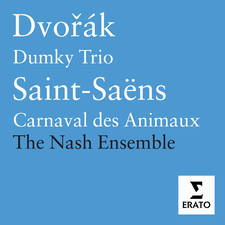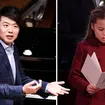Lang Lang: By Royal Command
The new Piano Concerto by Nigel Hess, commissioned by The Prince of Wales in memory of his grandmother and performed by Lang Lang, is destined to be a fitting tribute.
Its simple, at times sentimental, melodies effortlessly conjure up the diminutive figure of The Queen Mum smiling sweetly. Hess, an award-winning composer of television music and film soundtracks, was the perfect choice for this occasion: it was after hearing his music for the film Ladies In Lavender that Prince Charles asked him to write the piece.
Hess is the great-nephew of another figure who became legendary for her work during the Second World War, pianist Myra Hess. He remembers watching the film Listen To Britain and seeing his great-aunt playing in the National Gallery “with a radiant Queen Elizabeth in the audience, enjoying every note of the sublime music”.
Now, over 65 years later, he says it’s an honour for another Hess to be writing music in her memory.
Prince Charles was keen to have a piece that The Queen Mother herself would have enjoyed. The Concerto is a portrait of the much-loved lady, based on conversations Hess had with Prince Charles, and with her niece, Lady Margaret Rhodes, who sparked off the idea for the first movement.
“She showed me a photograph of The Queen Mother at Balmoral, dressed in her walking clothes, extending her arms in greeting with that devastating smile that so captivated both her friends and the country. Suddenly the Piano Concerto was right there.”
The Prince of Wales had another surprise.
"It wasn’t until I’d finished that I learnt that he’d asked Lang Lang to give the premiere,” says Hess. “I was delighted, and a little bit apprehensive… but the moment he started playing, I thought, ‘We’re home and dry’. He understood what the piece was about.”
Lang Lang remembers his first meeting with Prince Charles after a concert in 2006.
“He told me about his connection with music and that he played the cello. He said he hoped that Prince William would listen to more classical music as well!”
Afterwards, Lang Lang received a personal letter from The Prince saying he was touched by his music-making. He asked if Lang Lang would play a newly commissioned piece.
The first performance took place in a church in Norfolk, because, says Hess, “It was where The Queen Mother attended her last concert before she died.”
Part of the Music in Country Churches series, it was an intimate event for about 300 people – very different from the Albert Hall-sized venues that Lang Lang is used to playing in.
“It was a very touching event for The Prince,” says the pianist, who remembers seeing Prince Charles looking emotional. For Hess, the premiere was a great night.
“I felt we were just doing a performance for friends. We went to Sandringham afterwards and had a lovely meal. It was very down to earth.”
Composer and pianist have obviously enjoyed working together. The Concerto really appeals to Lang Lang, who says he’s had problems with some contemporary commissions.
“Composers today write something but they don’t play the piano. Nigel plays the piano and understands the instrument,” he explains. “I think the second movement is one of the most beautiful slow movements you can find for the piano.”
The third movement, The Duty, is less serene.
“It’s the one section that when Prince Charles heard it he said, ‘I’m not so sure about this’,” says Hess. “But when I explained that it was about the Blitz, when the King and Queen worked hard to bolster the morale of Londoners, he understood.”
After the premiere, Lang Lang recorded the work with the London Chamber Orchestra and conductor Christopher Warren-Green. It’s released in August – an auspicious time for Lang Lang who’s playing at the opening of the Beijing Olympics.
Hess and Lang Lang hope to organise a London premiere, possibly in the form of a gala concert for The Prince’s Trust. Thanks to Lang Lang’s crammed diary no date has yet been fixed, but watch this space!
Hear it on…
Nigel Hess Piano Concerto Lang Lang (pf), LCO/Warren-Green An immediately affecting work whose three movements, ‘The Smile’, ‘The Love’, ‘The Duty’, sum up three aspects of The Queen Mother’s character. The first two are pictorial and tuneful; the third, recalling the Blitz, starts grittily but ends triumphantly. Lang Lang plays with great conviction. Universal 177 4850


























